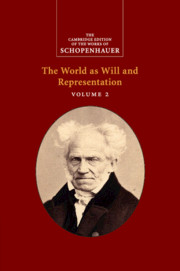Chapter 19 - On the Primacy of the Will in Self-Consciousness
Published online by Cambridge University Press: 30 June 2022
Summary
As thing in itself, the will constitutes the true, inner and indestructible essence of the human being: in itself, however, it is not conscious. This is because consciousness is conditioned by the intellect, and intellect is a mere accident of our essence, being a function of the brain which (along with the nerves and spinal cord attached to it) is merely a fruit, a product, even a parasite of the rest of the organism, not interfering directly in the organism's inner workings, but serving the purpose of self-preservation by regulating the organism's relations to the external world. The organism, for its part, is the visibility, the objecthood of the individual will, its image as it presents itself in that very brain (which we came to know in the First Book as the condition of the objective world in general), and hence as mediated by its forms of cognition, space, time and causality, and so presenting itself as something extended, acting in succession, and material, i.e. efficacious. Only in the brain are the limbs both sensed directly and intuited by means of the senses. – Accordingly, it can be said: the intellect is the secondary phenomenon, the organism is the primary i.e. the direct appearance of the will; the will is metaphysical, the intellect physical; the intellect, like its objects, is mere appearance; only the will is thing in itself; similarly, in an increasingly figurative sense and therefore metaphorically: the will is the substance of the human being, the intellect is the accident; the will is the matter, the intellect the form; the will is the heat, the intellect the light.
We wish to document and at the same time elucidate this thesis using the following facts concerning the inner life of the human being; and perhaps this occasion will result in a better understanding of the inner human than is found in many systematic psychologies.
(1) As already mentioned, it is not only consciousness of other things (i.e. perception of the external world) but also self-consciousness that contains something that has cognition and something that is cognized:a otherwise it would not be consciousness.
- Type
- Chapter
- Information
- Schopenhauer: The World as Will and Representation , pp. 212 - 257Publisher: Cambridge University PressPrint publication year: 2018



